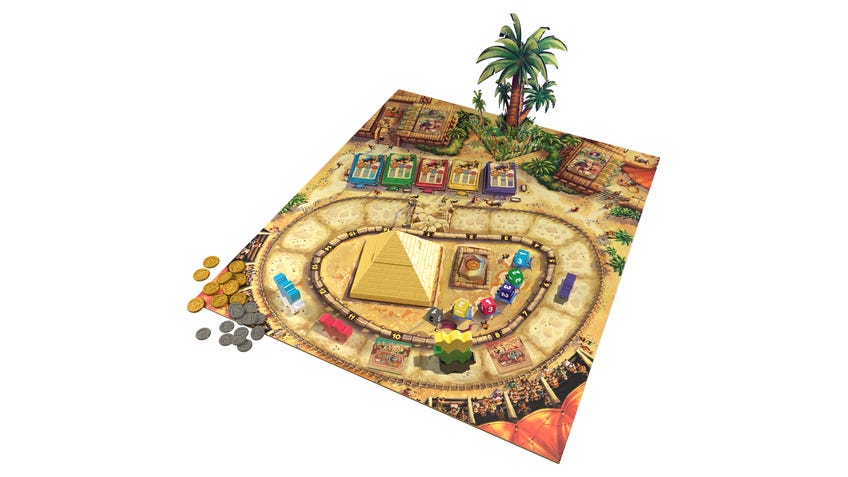What are you playing this weekend? Here’s what we’ve been playing!
Tell us what’s on your table.
It’s the time of the week to get together and chat about what we’ve been playing lately!
Every Friday, the Dicebreaker team gathers to share their thoughts on the board games, RPGs and other tabletop games we’ve been playing over the past seven days or so. Some games might be familiar from the website and YouTube channel, while others are things we haven’t been able to cover elsewhere just yet.
It’s also your chance to tell us what’s been on your table lately! From the biggest boxes of Kickstarted cardboard and plastic to indie gems or even just your latest miniatures paint job, we’d love to hear about it.
This week, we’ve been going through our trading card collections and saddling up for a camel race!
Let us know in the comments what you’ve been playing recently!
What We’ve Been Playing - March 10th 2023
Magic: The Gathering, Pokémon and Yu-Gi-Oh! cards
I’ve not been playing as many games this week, but my wife and I did recently dare to venture into our collection of trading cards for games like Magic: The Gathering, Pokémon and Yu-Gi-Oh!
As it turns out, we’d amassed several thousand cards over the years, but had never bothered to actually go through them and organise them in any logical way. We had a land station for playing Draft in MTG, but otherwise random cards and decks from sets spanning the last near-decade were chucked into boxes after playing and rarely touched since.
As someone who diligently catalogues his vinyl collection with Discogs, I found TCGplayer to be a fairly satisfying way of quickly scanning cards and creating a list. It also estimates the value of your cards - surprise, surprise, none of ours are likely to see us retire anytime soon.
After that, it was a case of going through and arranging them into a more organised collection. For MTG I split by colours - with planeswalkers and dual lands etc. in their own piles - although I’d be interested to hear how other folks divvy theirs up. Hopefully this way I might actually build some decks and use them a bit more. (Who am I kidding, I’ll keep playing Draft and the incredible Pack Wars.)
As for Pokémon, most of the cards we still have are my wife’s collection from when she was a kid - including several obvious fakes she was presumably tricked into trading for on the playground. I foolishly sold my entire card collection when I hit my teenage years, probably for a fraction of what it was worth. (The jewel in my collection at the time was a shiny Venusaur apparently worth £30 from a local game shop, which felt like all the money in the world then.)
I’d never sell any of the cards I own, but it was a fun trip to go through and discover the cards that had become more highly-sought over the years. Fingers crossed this actually encourages me to play more regularly, rather than just sitting on a pile of cardboard.
Matt
Camel Up: Second Edition

An old favourite was brought out onto a fresh table this week. Camel Up: Second Edition is the newest - and best - version of a modern classic, one that does an exceptional job of providing an accessible tabletop experience that does a bit more than your bog-standard family board game.
In the game, players attempt to gather the most money possible by betting on a single, epic camel race. Taking place over a series of rounds, the results of this race are determined by a set of dice - with each one corresponding to a camel. (Except for the grey dice, which corresponds to two.) On their turn, players can choose to do one of a variety of different actions, from placing bets to rolling dice.
Players can take one of the game’s betting slips in the hope that the corresponding camel will be in either first or second place at the end of the round. The sooner a player bets on a camel, the higher the reward will be if they do finish in first place. However, taking a betting slip for a camel that does not come first or second will end up costing players.
Alternatively, players can place a bet on the winner or loser of the overall race by placing the matching card on either board space. Whoever placed the first bet on the correct answer wins the largest amount of money at the end. As with the round bets, placing incorrect bets will also cost players.
Otherwise players can put their +1/-1 token on one of the track spaces in the hopes it will be landed on and grant them some money in return, or they can roll a die from the pyramid in the middle - thereby causing a camel to move across the track. Besides the randomness of the die roll, the aspect that really makes Camel Up unpredictable is the fact that camels can land on top of another stack - meaning that if one on the bottom moves, then all the others go with it. Add to this the backwards camels - who go the opposite way to the others - and Camel Up can get pretty chaotic.
Nevertheless, the game has the right balance of luck to strategy to make it more engaging than your average Monopoly or Snakes and Ladders, but still light enough that it won’t be too much for less experienced players to get their heads around. This is why Camel Up is such an endearing board game. That, and the pop-up palm tree and plastic pyramid dice shaker.
Meehan

